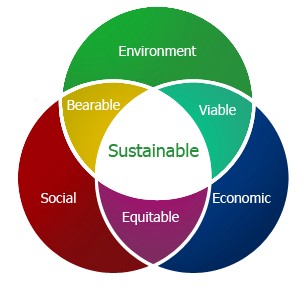What is sustainability
Current understandings of sustainability are based on the Brundtland Commission’s definition of sustainable development, to "meet the needs of the present without compromising the ability of future generations to meet their own needs” (1987).
The economy and society depend on the natural environment to prosper, so it is imperative that natural resources only be used at the same rate that they can be replenished.

Sustainability can be achieved through a balance of social, environmental and economic priorities.
There are several criteria that should be considered to ensure that practices are environmentally sustainable.
These include the management of renewable and non-renewable resources, the consideration of greenhouse gas emissions, the careful management of wastes, and biodiversity conservation.
These environmental priorities should be balanced with social and economic outcomes to ensure sustainable development for all generations on a local and global scale.
At UQ, we strive to incorporate sustainable practice into all aspects of university life, from daily operations to long-term goals for minimising our impact on the planet.
Our approach to sustainability is designed to address environmental, social and economic concerns and create change for a brighter future, on campus and beyond.
